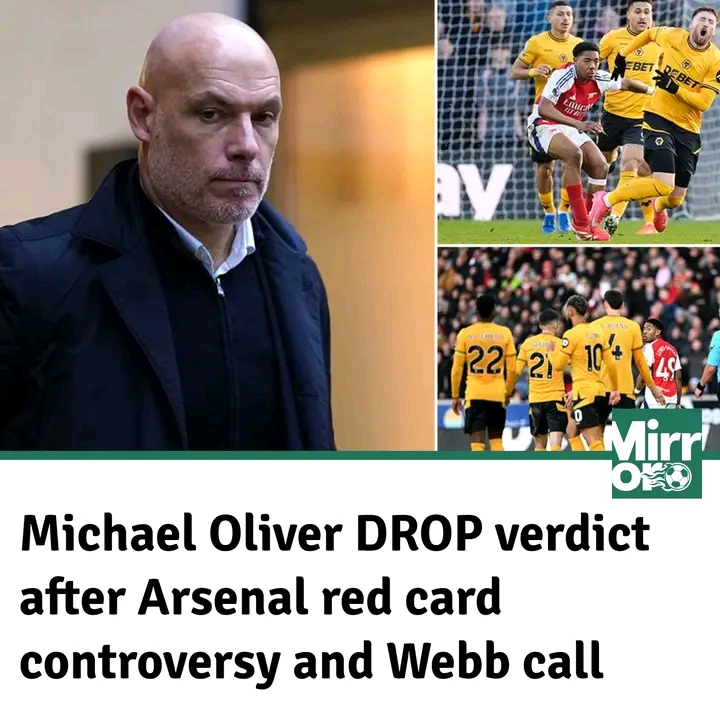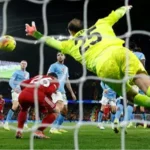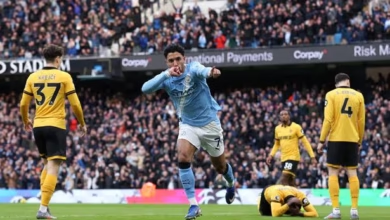A big call from Howard Webb incoming after a Controversial red card against Wolves

Wolverhampton Wanderers’ manager Gary O’Neil has been left frustrated and seeking clarification following a controversial last-minute goal from Manchester City during their Premier League clash at Molineux. The match, played on October 20, 2024, saw Manchester City snatch a 2-1 victory in the dying seconds of the game. The decision surrounding John Stones’ last-gasp header raised significant questions, leading O’Neil to plan talks with the head of refereeing in English football, Howard Webb, to understand the reasoning behind the call and the use of VAR in such situations.
The match was a dramatic and tense affair. Wolves were on the brink of securing just their second point of the season, but the match ended in heartbreak when John Stones scored in the 95th minute, handing Manchester City a valuable three points. The goal initially looked to have been ruled out by the assistant referee due to an offside infraction. The official had judged that Bernardo Silva was in an offside position and obstructing the view of Wolves goalkeeper Jose Sa when Stones headed home. However, after a review by the Video Assistant Referee (VAR) system, Stuart Attwell called referee Chris Kavanagh over to the pitchside monitor for a second look. After reviewing the footage, Kavanagh reversed his decision, and the goal was given. This decision handed City all three points in a match where they had been far from their best but were ultimately rewarded by the late intervention of the VAR.
The disallowed goal had initially seemed like a moment of hope for Wolves, who had been battling hard against a much stronger City side. The decision to reverse the call left O’Neil visibly frustrated, questioning not only the specific decision in this instance but also raising broader concerns about whether referees and VAR officials are subconsciously influenced by the dominance of Premier League’s top clubs, like Manchester City. His comments suggested a belief that referees might be more inclined to favor big clubs in tight decisions, something that is often a topic of discussion in English football.
O’Neil acknowledged the complexity of the situation, admitting that he could see how the decision could go either way. However, he made it clear that from his perspective, the decision to overturn the assistant referee’s call was unjust. He drew a comparison to an incident from the previous season when a similar situation had arisen during a match between Wolves and West Ham. In that case, a goal was disallowed because the goalkeeper’s view had been obstructed by a player in close proximity. O’Neil pointed out that the reasoning given for that disallowed goal was that the player was too close to the goalkeeper, thereby interfering with his line of sight. He argued that Bernardo Silva was similarly close to Sa and, in his view, should have been considered to have interfered with the goalkeeper’s ability to make a save.
The Wolves manager also pointed to the inconsistency he perceived in how similar situations were being handled. He recalled that in the West Ham match, the disallowed goal had been ruled out due to the proximity of the player to the goalkeeper, yet in this instance, Silva was judged to be not interfering enough to warrant the same ruling. O’Neil’s frustration was palpable as he spoke to the media after the match, stressing that it felt like Wolves were never going to get the benefit of the doubt. He also expressed a sense of inevitability about the outcome, admitting that he did not have much faith that the decision would be made in their favor, given the circumstances.
In the aftermath of the controversial decision, O’Neil revealed that he would be reaching out to Howard Webb, the chief of the Professional Game Match Officials Limited (PGMOL), the body responsible for overseeing referees in English football. O’Neil made it clear that his intention was not to argue the decision but rather to gain a better understanding of the thought process behind the call and the application of VAR in such scenarios. He expressed a desire to know why certain decisions are made the way they are, particularly when the evidence is not entirely conclusive.
O’Neil stated that in many of the reviews he had received in the past, decisions were often deemed “right” even when they were not entirely clear-cut. He said that the reviews often came back with a message that the decision was correct, even when it was difficult to understand how that conclusion had been reached. His goal was to engage in a constructive conversation with Webb to get a clearer sense of how VAR decisions are made and whether there is room for improvement in the system, especially in terms of consistency. O’Neil’s approach seemed to focus on gaining a deeper understanding of the process rather than seeking to overturn the decision itself. It was clear that his frustration was more with the lack of transparency and consistency rather than any personal vendetta against the referee or VAR officials involved in the match.
The controversial nature of the decision highlighted broader issues within English football and the use of VAR. While many have argued that VAR has improved the accuracy of officiating, situations like the one at Molineux underscore the ongoing debates around its implementation. One of the key criticisms of VAR is its perceived inconsistency. Decisions that seem clear on one occasion are sometimes overruled on another, leading to confusion among players, managers, and fans alike. The lack of transparency in the decision-making process has led to questions about whether the technology is being used effectively and fairly.
For Wolves, this latest controversy was just another blow in what had been a difficult season. The team had shown promise in the match against Manchester City, especially in the first half, but the late goal denied them what would have been a valuable point against one of the top teams in the league. While the result was disappointing, O’Neil’s comments highlighted a deeper frustration with the challenges that smaller clubs face when competing against the financial and reputational power of the Premier League’s elite clubs. Wolves had fought hard throughout the match, and O’Neil felt that they deserved more for their efforts. The decision to allow the goal in the final moments of the game felt like another instance of the big clubs being given preferential treatment.
As for Manchester City, the win was crucial as they continued their push for the Premier League title. While the result was important, the controversy surrounding the goal added a layer of uncertainty to the victory. Pep Guardiola’s side had not played their best football, but they were able to take advantage of the decision and claim the three points. Guardiola, however, remained diplomatic in his post-match comments, focusing on the positive aspects of his team’s performance rather than getting involved in the controversy. His priority was the points, and City moved on to their next challenge with the three points in the bag.
For Wolves, the defeat was hard to take, but they would need to quickly regroup and focus on their upcoming fixtures. The team had shown resilience against Manchester City, and O’Neil would need to ensure that his players did not let the frustration of the decision affect their performance in the next match. Wolves’ survival in the Premier League would depend on their ability to maintain their fighting spirit and take points where possible.
The aftermath of the match, and O’Neil’s intention to speak with Howard Webb, pointed to a wider issue within the Premier League and its officiating system. The use of VAR had promised to reduce controversy and ensure more accurate decisions, but incidents like this one suggest that there is still room for improvement. The debate over the fairness and consistency of VAR will likely continue as long as such decisions remain a topic of contention among clubs, players, and fans. O’Neil’s comments, while focused on this particular incident, reflect a wider frustration with the challenges faced by smaller clubs in the face of decisions that often seem to favor the bigger teams.
As the season progresses, Wolves will hope for better fortune in future matches. The team will aim to build on the positive aspects of their performance against Manchester City and focus on securing the points they need to climb up the Premier League table. O’Neil’s discussions with Howard Webb will be an important part of this process, as he seeks clarity and understanding in an effort to ensure that his team is treated fairly by the refereeing system. The controversy at Molineux may fade with time, but the issues it raised about VAR and refereeing in general will likely continue to spark debate throughout the rest of the season.
















He atrocities against Arsenal is uncalled for it obvious that he hate us with passion so we don’t want him as referee again in all our games from on till entity